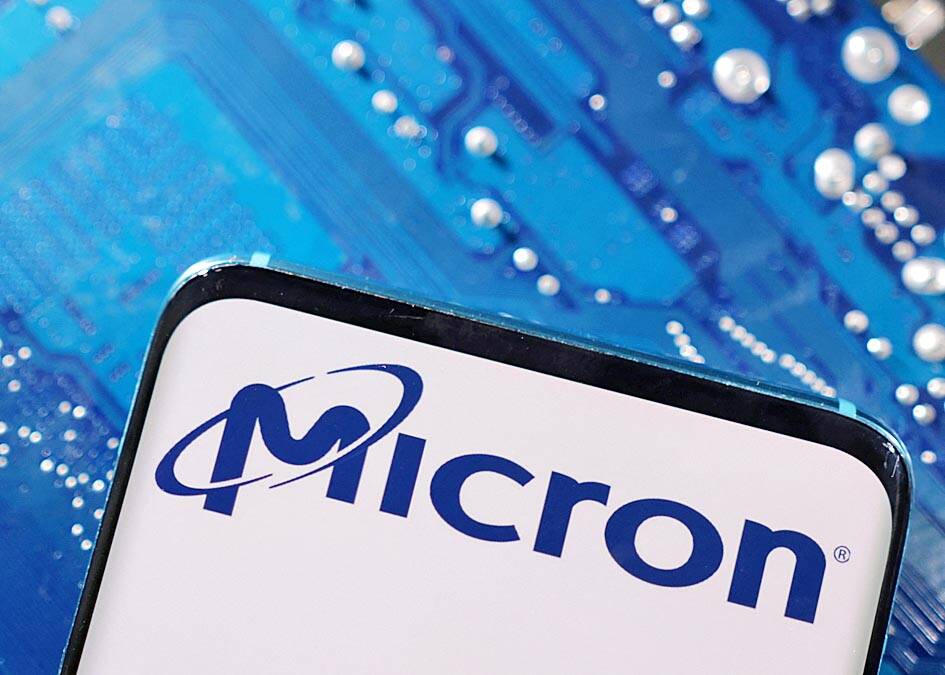US-based memorychip supplier Micron Technology Inc on Friday said that it would start producing its most advanced DRAM exclusively in Taiwan in 2025.
Micron said that it would mass produce chips using its advanced 1-gamma process node DRAM in Taiwan, ahead of any other production site worldwide.
The company installed cutting-edge extreme ultraviolet (EUV) lithography production equipment in its A3 fab in Taichung last year.

Photo: Reuters
The 1-gamma process — its third-generation 10 nanometer-class node — was jointly developed by Micron’s research and development (R&D) teams in Taiwan and Japan.
Micron on Thursday said it would invest up to US$3.6 billion in Japan.
A Ministry of Economic Affairs official said that Micron had informed the ministry of its investment plan in Japan before it was announced.
Micron’s R&D program in Taiwan remains unchanged and would continue as planned, the official said.
The statements from Micron and the ministry apparently aim to ease concerns over the company’s future in Taiwan.
Micron announced its Japanese investment plan after Japanese Prime Minister Fumio Kishida met with executives from seven semiconductor companies, including Micron and Taiwan Semiconductor Manufacturing Co (台積電). The others were Applied Materials Inc, IBM Corp, Samsung Electronics Co, Intel Corp and Belgian semiconductor research group Interuniversity Microelectronics Centre.
The plan would include additional investment over the next few years in Micron’s factory in Hiroshima Prefecture, the company said.
According to a report from Nikkei Asia, the Hiroshima plant produces advanced DRAM chips and the US chipmaker plans to install a state-of-the-art production line there, with Tokyo’s backing.
That could include EUV lithography production equipment, needed for the mass production of the 1-gamma process, which Micron said it would install in Japan, without specifying whether it would be used at the Hiroshima facility.
EUV refers to a soft X-ray technology, which has a wavelength of 13.5 nanometers.
Micron is the largest foreign employer and foreign direct investor in Taiwan, with more than 10,000 workers in its fabs in Taichung and Taoyuan.
Micron has said it would continue to recruit highly skilled personnel in the years ahead.
The Taoyuan factory is from Micron’s acquisition of Taiwanese DRAM maker Inotera Memories Inc (華亞科技) in 2016, while the Taichung factory is from the acquisition of another local DRAM maker, Rexchip Electronics Corp (瑞晶電子), in 2012.

TECH CLUSTER: The US company’s new office is in the Shalun Smart Green Energy Science City, a new AI industry base and cybersecurity hub in southern Taiwan US chip designer Advanced Micro Devices Inc (AMD) yesterday launched an office in Tainan’s Gueiren District (歸仁), marking a significant milestone in the development of southern Taiwan’s artificial intelligence (AI) industry, the Tainan City Government said in a statement. AMD Taiwan general manager Vincent Chern (陳民皓) presided over the opening ceremony for the company’s new office at the Shalun Smart Green Energy Science City (沙崙智慧綠能科學城), a new AI industry base and cybersecurity hub in southern Taiwan. Facilities in the new office include an information processing center, and a research and development (R&D) center, the Tainan Economic Development Bureau said. The Ministry

ADVERSARIES: The new list includes 11 entities in China and one in Taiwan, which is a local branch of Chinese cloud computing firm Inspur Group The US added dozens of entities to a trade blacklist on Tuesday, the US Department of Commerce said, in part to disrupt Beijing’s artificial intelligence (AI) and advanced computing capabilities. The action affects 80 entities from countries including China, the United Arab Emirates and Iran, with the commerce department citing their “activities contrary to US national security and foreign policy.” Those added to the “entity list” are restricted from obtaining US items and technologies without government authorization. “We will not allow adversaries to exploit American technology to bolster their own militaries and threaten American lives,” US Secretary of Commerce Howard Lutnick said. The entities

Minister of Finance Chuang Tsui-yun (莊翠雲) yesterday told lawmakers that she “would not speculate,” but a “response plan” has been prepared in case Taiwan is targeted by US President Donald Trump’s reciprocal tariffs, which are to be announced on Wednesday next week. The Trump administration, including US Secretary of the Treasury Scott Bessent, has said that much of the proposed reciprocal tariffs would focus on the 15 countries that have the highest trade surpluses with the US. Bessent has referred to those countries as the “dirty 15,” but has not named them. Last year, Taiwan’s US$73.9 billion trade surplus with the US

The Taipei International Cycle Show (Taipei Cycle) yesterday opened at the Taipei Nangang Exhibition Center, with the event’s organizer expecting a steady recovery in the industry this year following a tough last year. This year, 980 companies from 35 countries are participating in the annual bicycle trade show, showcasing technological breakthroughs and market development trends of the bicycle industry at 3,600 booths, the Taiwan External Trade Development Council (TAITRA, 外貿協會) said in a statement. Under the theme “Ride the Revolution,” the exhibition has attracted more than 3,500 international buyers from 80 countries to preregister for the four-day event, which is expected to